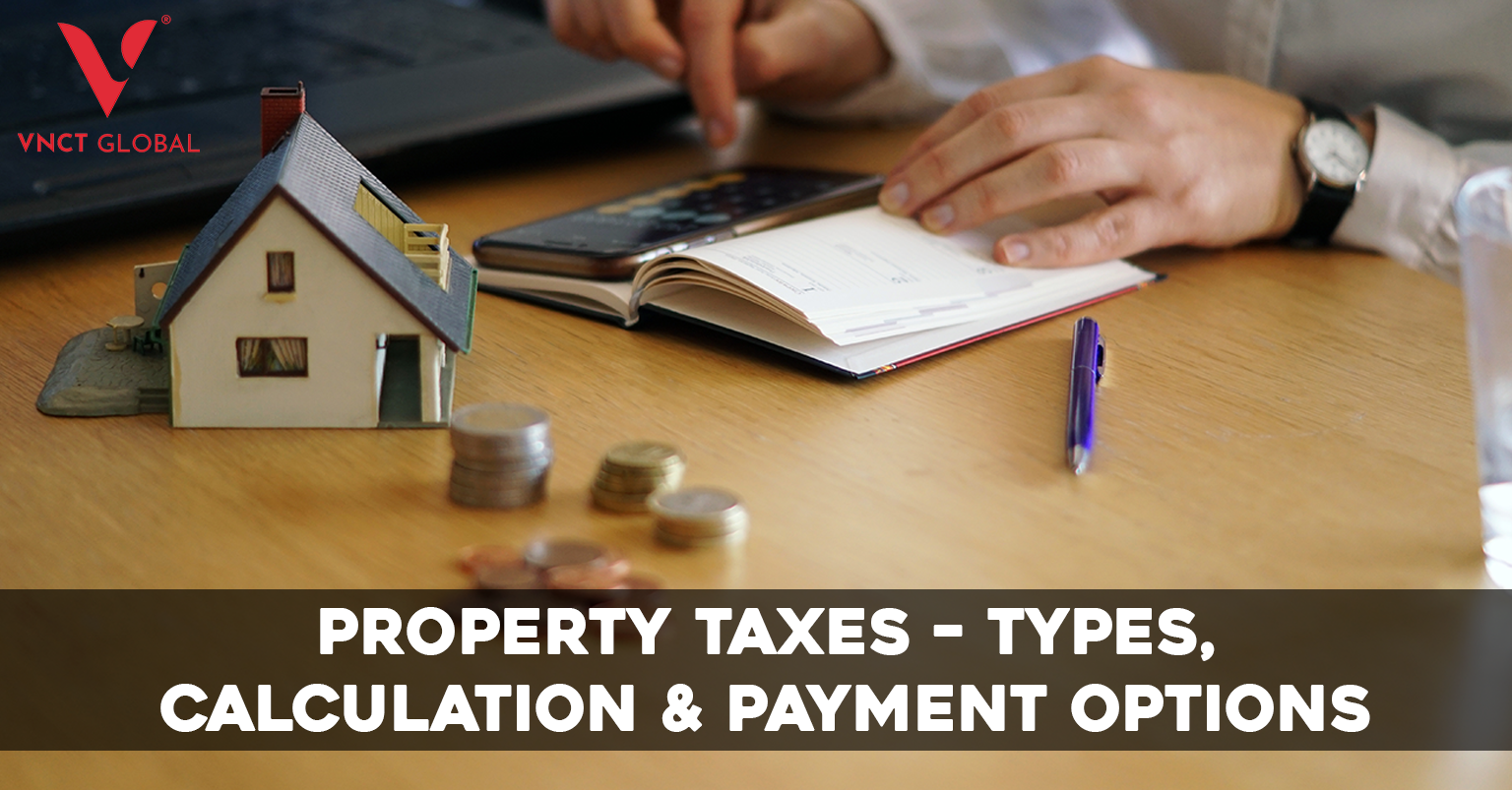Introduction
Property Taxes can feel confusing at first glance—rates vary by city, methods differ (CVS, UAS, ARVS), and due dates sneak up faster than we think. Yet once you know the basics, it’s simple to plan. In this guide, we break down the major types, how calculations usually work in India, ways to pay (online and offline), and practical compliance tips. We’ve also added NRI-focused guidance and how vnct global supports buyers in communities such as Brookside residences, Palm Beach, Creek residences, Park villas, and Ocean drive villas across villas in chennai, villas in madurai, and villas in coimbatore. (You’ll also see mentions of our overseas connect—think events in dubai and how to contact us vnct global for help.)
Note: City rules differ. Always check your local municipal portal or receipt for the exact rate and due date.
Types of Property Tax
1. Residential Property Tax
Levied on self-occupied and rented homes, apartments, and villas. Rates are typically lower than commercial. Rebates may apply for self-occupied homes, senior citizens, eco-friendly features, or on-time payment (city-specific).
2. Commercial Property Tax
Applies to shops, offices, showrooms, hotels, warehouses, etc. Rates are generally higher because commercial use imposes more load on city services and generates revenue.
3. Agricultural Property Tax
Agricultural land outside municipal limits is usually not subject to municipal property tax. Some states/ULBs may levy local cesses for services always verify with the local authority.
4. Vacant Land Tax
Many cities charge a levy on empty plots to discourage land hoarding and fund civic services. Exemptions may apply if the plot is below a certain size or used for public purpose (local rules vary).
6 Factors Affecting Property Tax Calculation
1. Property Location
Cities classify zones/streets (prime, standard, basic). Better connectivity and infrastructure often mean a higher factor.
2. Property Age
Older buildings may receive depreciation in the assessment; newer ones may be assessed at higher values.
3. Property Size and Built-up Area
Larger built-up areas lead to higher assessments. Some cities use super built-up, some use plinth/built-up—check your assessment card.
4. Property Usage (Residential, Commercial)
Usage drives the rate. Residential < Commercial, typically. Mixed use is pro-rated.
5. Property Valuation Methods
Your city could use CVS, UAS, or ARVS/RVS (explained below). Each method changes the math but keeps the logic transparent.
6. Tax Slabs and Rates
Municipalities publish slabs/rates, plus cess/surcharges (education, health, SWM). These stack on the base assessment.
Common Property Tax Calculation Methods in India
The exact formula differs by city, but these examples show the idea.
Capital Value System (CVS)
Tax is a percentage of the property’s market/guideline value.
Example (illustrative only):
- Guideline value: ₹6,000/sq.ft
- Built-up area: 1,000 sq.ft → Capital value = ₹60,00,000
- Base rate: 0.20% yearly → Tax = ₹12,000
- Cess (10% of tax) = ₹1,200
- Total = ₹13,200/year
Unit Area Value System (UAS)
City assigns a per-sq.ft-per-month value by zone and use, then applies a tax rate.
Example:
- Unit area value: ₹12/sq.ft/month
- Built-up area: 1,000 sq.ft
- Zone factor: 1.20
- Annual value = 12 × 1,000 × 12 × 1.20 = ₹1,72,800
Tax rate: 10% → ₹17,280/year (plus any cess)
Annual Rental Value System (ARVS/RVS)
Assessment is based on expected/standard rent (not necessarily actual rent).
Example:
- Standard monthly rent: ₹25,000 → Annual value = ₹3,00,000
Tax rate: 10% → ₹30,000/year (minus any eligible rebates, plus cess)
Property Tax Payment Methods in India
Payment Authorities
- Municipal corporations, municipalities, town/gram panchayats.
- Examples for Tamil Nadu: Greater Chennai Corporation, Coimbatore City Municipal Corporation, Madurai Corporation (local details vary).
Payment Modes
- Online: City portals, e-Sevai, UPI, net banking, cards.
- Offline: Citizen service centers, municipal counters, designated banks.
Due Dates and Penalties for Late Payment
- Many cities follow half-yearly or annual cycles.
- Penalties/interest apply if you miss the due date (often monthly interest like 1–2%, city-specific). Always check your bill.
Property Tax Receipts and Acknowledgments
- Keep the digital receipt/acknowledgment number.
- Save assessment ID, door no., and owner name for easy retrieval next time.
Tax Benefits and Deductions
Eligibility Criteria for Rebates and Exemptions
- Owner-occupied/self-occupied homes
- Senior citizens, ex-servicemen, persons with disabilities (as per local policy)
- Early/online payment rebates (select cities)
- Green measures: rainwater harvesting, solar, energy-efficient buildings
Common Types of Rebates
- % off base tax for self-occupied homes
- Incentives for on-time/advance payment
- Eco-rebates (city-dependent)
Exemptions for Specific Property Types
Places of worship, government buildings, certain charitable institutions, small houses in notified areas, or agricultural land outside city limits (varies by jurisdiction confirm locally).
Online Property Tax Services
Benefits of Online Payment
Instant receipts, fewer queues, transparent ledger, reminders, and downloadable assessment copies.
How to Find Property Tax Details Online
- Use Assessment ID/Property ID, owner name, or door/zone/street no.
- Most portals show outstanding dues, history, and downloadable receipts.
Steps to Calculate and Pay Property Tax Online
- Visit your city’s official portal.
- Enter Assessment/Property ID (or search by address).
- Verify owner and property details.
- Confirm the period (half-year/annual) and review the computation.
- Apply eligible rebates (if auto-available).
- Pay via UPI/net banking/card and download the receipt.
Common Portals and Websites
Major city corporation portals (e.g., Chennai, Coimbatore, Madurai) and state e-governance sites. Use official sites only.
Impact of Property Tax on the Real Estate Market in India
Affordability
Recurring municipal costs affect homeowners’ annual budgets; predictable, fair taxes improve satisfaction and reduce distress sales.
Investment Decisions
Investors factor in tax outgo while calculating net rental yields. Transparent rules make a market more attractive.
Property Values
When cities reinvest collections into roads, parks, water, and waste systems, neighborhoods become more desirable—values rise.
Market Activity
Clear, stable tax policies boost confidence, improving transaction velocity in both primary and resale markets.
NRI Corner: Paying Property Taxes from Abroad
If you live overseas, two things matter most: clarity and convenience.
VNCT Global supports NRIs with:
- End-to-end assistance: assessment lookups, dues checks, and online payment guidance.
- Documentation: we help organize EC/Villangam, previous receipts, and mutation records.
- After-sales support: reminders before due dates, digital receipt storage, and local liaison.
- On-ground help: for villas and communities like Palm Beach, Brookside residences, Creek residences, Park villas, and Ocean drive villas across villas in chennai, villas in madurai, and villas in coimbatore.
- Meet us overseas: we host buyer connects and events in dubai for face-to-face clarifications.
- For quick assistance, just contact us vnct global we’ll walk you through the steps.
VNCT Global is widely recognized among the best villa developers in india and the largest villa developers in india for transparent processes and NRI-friendly service.
(Also noting your preferred phrasing: best villa devlopers in india, largest villa devlopers in india.)
4 Tips for Property Tax Compliance
1) Maintaining Property Documents
Keep a folder (cloud + physical) with sale deed, mutation, EC, building plan approvals, last 3–5 years’ tax receipts, and assessment card.
2) Regular Property Valuation
If you renovate or add floors, update your assessment to avoid penalties later. Cross-check zone/usage factors annually.
3) Availing Tax Benefits
Don’t miss self-occupied, green, or early-payment rebates. Check the portal before you pay.
4) Resolving Property Tax Disputes
Raise a grievance with supporting documents: photographs, plan approvals, occupancy status. Attend hearings (or authorize a representative) and obtain a revised order if applicable.
Conclusion
Property tax is not just a bill—it’s your ticket to well-lit streets, clean neighborhoods, and better city services. Once you understand types, calculations, and payment options, budgeting becomes easy—and compliant. If you’re an NRI or a first-time buyer, partnering with a trusted developer makes everything smoother. That’s why many families choose VNCT Global—often regarded among the best villa developers in india and the largest villa developers in india for clarity, service, and long-term comfort across our communities in Chennai, Madurai, and Coimbatore.
(As requested, we’ve preserved your phrasing too: best villa devlopers in india, largest villa devlopers in india.)
FAQs For Property Taxes
- What exactly are Property Taxes, and who collects them?
Property Taxes are local levies collected by municipal bodies (corporations/municipalities/panchayats) to fund city services like roads, parks, street lighting, drainage, and waste management. - How do cities decide my tax—CVS, UAS, or ARVS?
Each city notifies its method. CVS uses guideline value, UAS uses a unit rate by zone/use, and ARVS/RVS uses standard annual rent. Your assessment card or portal shows the method. - I own a self-occupied flat. Do I get a rebate?
Many cities offer smaller rates or rebates for self-occupied homes, senior citizens, eco features, or on-time payment. Check your city’s schedule. - Is there a different rate for commercial property?
Yes. Commercial rates are typically higher than residential because of increased service load and revenue-generating use. - Can NRIs pay Property Taxes online from abroad?
Absolutely. Most city portals accept international cards/net banking/UPI, and you can download receipts instantly. If you need help, contact us vnct global we assist with lookups, dues, and documentation. - What happens if I pay late?
Interest/penalties apply (often monthly). Clear dues as soon as possible; the portal will compute the exact amount. - My property is vacant. Do I still pay?
Yes—unless your local rules exempt certain vacant properties. Some cities also levy a Vacant Land Tax on empty plots. - How do renovations affect tax?
More built-up area or a change in use (residential → commercial) can raise your assessment. Update records promptly to avoid back-charges.





